|
Books Should Be Free Loyal Books Free Public Domain Audiobooks & eBook Downloads |
|
|
Books Should Be Free Loyal Books Free Public Domain Audiobooks & eBook Downloads |
|
History Books |
|---|
|
Book type:
Sort by:
View by:
|
By: John Ashton (1834-1911) | |
|---|---|
 Gossip in the First Decade of Victoria's Reign
Gossip in the First Decade of Victoria's Reign
| |
By: John Aubrey (1626-1697) | |
|---|---|
 The Natural History of Wiltshire
The Natural History of Wiltshire
| |
By: John Augustine Zahm (1851-1921) | |
|---|---|
 Woman in Science
Woman in Science
A history of woman's role in science through the ages and the many contributions she has made.Chapter Titles are:1. Woman's Long Struggle for Things of the Mind2. Woman's Capacity for Scientific Pursuits3. Women in Mathematics4. Women in Astronomy5. Women in Physics6. Women in Chemistry7. Women in the Natural Sciences8. Women in Medicine and Surgery9. Women in Archæology10. Women as Inventors11. Women as Inspirers and Collaborators in Science12. The Future of Women in Science: Summary and Epilogue | |
By: John Auldjo (-1857) | |
|---|---|
 Journal of a Visit to Constantinople and Some of the Greek Islands in the Spring and Summer of 1833
Journal of a Visit to Constantinople and Some of the Greek Islands in the Spring and Summer of 1833
| |
By: John Austin Stevens (1827-1910) | |
|---|---|
 Albert Gallatin American Statesmen Series, Vol. XIII
Albert Gallatin American Statesmen Series, Vol. XIII
| |
By: John B. (John Beach) Driggs (1854-) | |
|---|---|
 Short Sketches from Oldest America
Short Sketches from Oldest America
| |
By: John B. Bury (1861-1927) | |
|---|---|
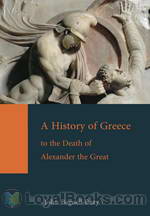 A History of Greece to the Death of Alexander the Great
A History of Greece to the Death of Alexander the Great
For the Irish historian John Bagnell Bury, history should be treated as a science and not a mere branch of literature. Many contemporary histories written in the late nineteenth and early twentieth century were poetic and heroic in tone, blending fact and fiction, myths and legends. They sometimes relied on sources from Shakespeare and classical poets. For Bury, the facts of history may be legendary or romantic in nature, but they should be recounted in a scholarly and non-judgmental manner, without the accompanying emotions... | |
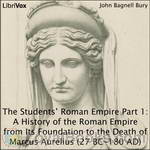 The Students' Roman Empire
The Students' Roman Empire
The writings of J. B. Bury (1861-1927), on subjects ranging from ancient Greece to the 19th-century papacy, are at once scholarly and accessible to the layman. This work covers the period from the beginning of the Roman Empire until Gibbon begins; from Augustus through Marcus Aurelius and the Antoinine Emporers. | |
 The Idea of Progress An inguiry into its origin and growth
The Idea of Progress An inguiry into its origin and growth
| |
By: John Bach McMaster (1852-1932) | |
|---|---|
 A School History of the United States
A School History of the United States
| |
 A Brief History of the United States
A Brief History of the United States
| |
By: John Bagnell Bury (1861-1927) | |
|---|---|
 Cambridge Medieval History, Volume 01, The Christian Roman Empire and the Foundation of the Teutonic Kingdoms
Cambridge Medieval History, Volume 01, The Christian Roman Empire and the Foundation of the Teutonic Kingdoms
Volume 1: The Christian Roman Empire and the Foundation of the Teutonic Kingdoms "The present work is intended as a comprehensive account of medieval times, drawn up on the same lines as The Cambridge Modern History but with a few improvements of detail suggested by experience. It is intended partly for the general reader, as a clear and, as far as possible, interesting narrative; partly for the student, as a summary of ascertained facts, with indications of disputed points; partly as a book of reference, containing all that can reasonably be required in a comprehensive work of general history." - Summary by KevinS | |
 Idea of Progress: An Inquiry into Its Origin and Growth
Idea of Progress: An Inquiry into Its Origin and Growth
John Bagnell Bury was Regius Professor of Modern History at Cambridge University in the early twentieth century. In The Idea of Progress, he assesses the concepts of history found in the classical period and then traces the historical development of the concept of political and social progress by looking at writers from the sixteenth to the nineteenth century. It is interesting to consider what the history of the past hundred years would add to such an analysis. - Summary by Barry Ganong | |
By: John Bates Clark (1847-1938) | |
|---|---|
 Social Justice Without Socialism
Social Justice Without Socialism
| |
By: John Beatty (1828-1914) | |
|---|---|
 The Citizen-Soldier or, Memoirs of a Volunteer
The Citizen-Soldier or, Memoirs of a Volunteer
| |
By: John Blakman | |
|---|---|
 Henry the Sixth A Reprint of John Blacman's Memoir with Translation and Notes
Henry the Sixth A Reprint of John Blacman's Memoir with Translation and Notes
| |
By: John Brown (1830-1922) | |
|---|---|
 History of the English Bible
History of the English Bible
The celebration of the Tercentenary of the Authorized Version of the English Bible of 1611 has called into existence the little book here presented to the reader's notice. It is the brief repetition of a story beginning in 670 A.D. and reaching on for twelve hundred years to 1879. It takes us back to the Monastery of Whitby where Caedmon the monk paraphrased Scripture story in Saxon song, and brings us through the centuries to the Abbey of Westminster where a distinguished body of English scholars met in 1870 and commenced that Revision of the Scriptures which first saw the light in 1881. | |
By: John Buchan (1875-1940) | |
|---|---|
 Last Secrets
Last Secrets
The author, John Buchan, maintains that "the main lines of the earth's architecture have been determined" during the first two decades of the twentieth century, and all that remains is but "amplifying our knowledge of the groyning and buttresses and stone-work." In this history of exploration, he tells of nine of those momentous final discoveries that placed the earth's last big secrets firmly on the map, from the mysterious "cloud city" of Lhasa, to the slopes--but not yet the summit--of Mount Everest. - Summary by Steven Seitel | |
By: John Buffa (-1812) | |
|---|---|
 Travels through the Empire of Morocco
Travels through the Empire of Morocco
| |
By: John Burroughs (1837-1921) | |
|---|---|
 Birds and Bees, Sharp Eyes, and Other Papers
Birds and Bees, Sharp Eyes, and Other Papers
Probably no other American writer has a greater sympathy with, and a keener enjoyment of, country life in all its phases—farming, camping, fishing, walking—than has John Burroughs. His books are redolent of the soil, and have such "freshness and primal sweetness," that we need not be told that the pleasure he gets from his walks and excursions is by no means over when he steps inside his doors again. As he tells us on more than one occasion, he finds he can get much more out of his outdoor experiences by thinking them over, and writing them out afterwards... | |
 Under the Maples
Under the Maples
| |
 Ways of Nature
Ways of Nature
| |
 Winter Sunshine
Winter Sunshine
| |
 Wake-Robin
Wake-Robin
| |
 Camping with President Roosevelt
Camping with President Roosevelt
| |
 The Wit of a Duck and Other Papers
The Wit of a Duck and Other Papers
| |
By: John C. Hutcheson | |
|---|---|
 Fritz and Eric The Brother Crusoes
Fritz and Eric The Brother Crusoes
| |
By: John Cadwalader (1742-1786) | |
|---|---|
 Nuts for Future Historians to Crack
Nuts for Future Historians to Crack
| |
By: John Caius (1510-1573) | |
|---|---|
 Epidemics of the Middle Ages
Epidemics of the Middle Ages
Justus Friedrich Carl Hecker was a German physician and medical writer, whose research focused on the history of epidemics, in a broad sense of the term that included pandemics like the Black Death as well as the group of social phenomena known as dancing mania. The Epidemics of the Middle Ages comprises three of his works -- The Black Death, The Dancing Mania, and The Sweating Sickness -- translated by the English epidemiologist Benjamin Guy Babington. Despite what the name of the book may suggest, the events it describes are not limited to the Middle Ages... | |
By: John Carr (1772-1832) | |
|---|---|
 The Stranger in France or, a Tour from Devonshire to Paris Illustrated by Engravings in Aqua Tint of Sketches Taken on the Spot.
The Stranger in France or, a Tour from Devonshire to Paris Illustrated by Engravings in Aqua Tint of Sketches Taken on the Spot.
| |
By: John Charles Dent (1841-1888) | |
|---|---|
 The Story of the Upper Canadian Rebellion, Volume 1
The Story of the Upper Canadian Rebellion, Volume 1
| |
By: John Charles Frémont (1813-1890) | |
|---|---|
 The Exploring Expedition to the Rocky Mountains
The Exploring Expedition to the Rocky Mountains
| |
By: John Charles Van Dyke | |
|---|---|
 A Text-Book of the History of Painting
A Text-Book of the History of Painting
A TEXT-BOOK OF THE HISTORY OF PAINTINGBY JOHN C. VAN DYKE, L.H.D.PREFACE.The object of this series of text-books is to provide concise teachable histories of art for class-room use in schools and colleges. The limited time given to the study of art in the average educational institution has not only dictated the condensed style of the volumes, but has limited their scope of matter to the general features of art history. Archaeological discussions on special subjects and aesthetic theories have been avoided... | |
By: John Clark Ridpath (1840-1900) | |
|---|---|
 James Otis, the pre-revolutionist
James Otis, the pre-revolutionist
| |
By: John Clay Coleman | |
|---|---|
 Jim Crow Car; Or, Denouncement of Injustice Meted Out to the Black Race
Jim Crow Car; Or, Denouncement of Injustice Meted Out to the Black Race
"My opposition to injustice, imposition, discrimination and prejudice, which have for many years existed against the colored people of the South, has led to this little book. In many parts of America the press has been furnished with “matter” for defending the colored people, through the medium of “Coleman’s Illustrated Lectures.” By request of my many auditors, some of whom being leading elements of the Northern States and Canada, this volume is published. Many persons interested in the welfare of the negro, have sought a more elaborate book on the Southern horrors... | |
By: John Cowper Powys (1872-1963) | |
|---|---|
 Suspended Judgments Essays on Books and Sensations
Suspended Judgments Essays on Books and Sensations
| |
By: John Crombie Brown (-1879?) | |
|---|---|
 The Ethics of George Eliot's Works
The Ethics of George Eliot's Works
| |
By: John D. (John Denison) Baldwin (1809-1883) | |
|---|---|
 Ancient America, in Notes on American Archaeology
Ancient America, in Notes on American Archaeology
| |
By: John D. Shortridge | |
|---|---|
 Italian Harpsichord-Building in the 16th and 17th Centuries
Italian Harpsichord-Building in the 16th and 17th Centuries
| |
By: John Davenport (1789-1877) | |
|---|---|
 Aphrodisiacs and Anti-aphrodisiacs: Three Essays on the Powers of Reproduction
Aphrodisiacs and Anti-aphrodisiacs: Three Essays on the Powers of Reproduction
| |
By: John David Hills | |
|---|---|
 The Fifth Leicestershire A Record Of The 1/5th Battalion The Leicestershire Regiment, T.F., During The War, 1914-1919.
The Fifth Leicestershire A Record Of The 1/5th Battalion The Leicestershire Regiment, T.F., During The War, 1914-1919.
| |
By: John De Morgan (1848-1926) | |
|---|---|
 The Hero of Ticonderoga or Ethan Allen and his Green Mountain Boys
The Hero of Ticonderoga or Ethan Allen and his Green Mountain Boys
| |
By: John Dee (1527-1608) | |
|---|---|
 The Private Diary of Dr. John Dee And the Catalog of His Library of Manuscripts
The Private Diary of Dr. John Dee And the Catalog of His Library of Manuscripts
| |
By: John Dennis (1825-1911) | |
|---|---|
 The Age of Pope (1700-1744)
The Age of Pope (1700-1744)
| |
By: John Denton Pinkstone French (1852-1925) | |
|---|---|
 1914
1914
| |
By: John Denvir (1843-1916) | |
|---|---|
 The Life Story of an Old Rebel
The Life Story of an Old Rebel
| |
By: John Dewey (1859-1952) | |
|---|---|
 China, Japan and the U.S.A. Present-Day Conditions in the Far East and Their Bearing on the Washington Conference
China, Japan and the U.S.A. Present-Day Conditions in the Far East and Their Bearing on the Washington Conference
| |
 Human Nature And Conduct - Part 1, The Place of Habit in Conduct
Human Nature And Conduct - Part 1, The Place of Habit in Conduct
John Dewey, an early 20th Century American philosopher, psychologist, educational theorist saw Social Psychology as much a physical science as Biology and Chemistry. This project encompasses Part 1 of 4 of his book Human Nature and Conduct. Dewey's uses the word "HABIT" as a specialized catch-all word to describe how a person and his/her objective environment interact. This interaction is the basis for moral judgement. Dewey writes: "All habits are demands for certain kinds of activity; and they constitute the self.” In other places he also asserts that "Habits are Will." - Summary by William Jones, Soloist | |
By: John Dos Passos (1896-1970) | |
|---|---|
 Three Soldiers
Three Soldiers
Three Soldiers, the second novel by John Dos Passos, follows the experiences of several young Americans thrown into the confusion and brutality of World War I.Written when the author was just twenty-three, it was key to the development of a realistic depiction of war in American literature, and earned Dos Passos, later named by Jean-Paul Sartre "the greatest living writer of our time", important early attention.Critic H L Menken said of it: "no war story can be written in the United States without challenging comparison with it--and no story that is less meticulously true will stand up to it... | |
 Rosinante to the Road Again
Rosinante to the Road Again
| |
By: John Doyle Lee (1812-1877) | |
|---|---|
 The Mormon Menace The Confessions of John Doyle Lee, Danite
The Mormon Menace The Confessions of John Doyle Lee, Danite
| |
By: John Dryden (1631-1700) | |
|---|---|
 Discourses on Satire and on Epic Poetry
Discourses on Satire and on Epic Poetry
| |
By: John Dryden Kuser (1897-1964) | |
|---|---|
 Haiti: Its Dawn of Progress after Years in a Night of Revolution
Haiti: Its Dawn of Progress after Years in a Night of Revolution
This book is part history and part travelogue, an account of a brief visit by a wealthy, white U.S. politician during a lamentable time in Haiti’s history of its invasion and occupation by the U.S. military. Dryden offers his views of elements of Haitian culture such as education, religion and commerce, with some optimism but with the shallow understanding of a casual observer who has not been immersed in the culture enough to provide truly insightful understanding. One chapter is an account of his duck hunting expedition. This is, nonetheless, valuable in helping us understand how many understood the Haitian situation in the early twentieth century. Summary by Larry Wilson. | |
By: John Earle (1824-1903) | |
|---|---|
 Anglo-Saxon Literature
Anglo-Saxon Literature
| |
By: John Emerich Edward Dalberg Acton Acton (1834-1902) | |
|---|---|
 Lectures on the French Revolution
Lectures on the French Revolution
| |
 A Lecture on the Study of History
A Lecture on the Study of History
| |
 Lectures on Modern history
Lectures on Modern history
| |
By: John Emerich Edward Dalberg-Acton (1834-1902) | |
|---|---|
 Human Sacrifice
Human Sacrifice
This was one of Lord Acton's essays, that was in response to the publication of the letters between Sir Robert Peel and Lord Macaulay. Lord Acton hoped to refute the common prejudice that the religious practice of sacrificing human victims was not always carried out by unfeeling and uncivilized people, but was in some cases the development of an advanced theology. At the insistence of Lord Stanhope, Acton published the essay in the Home And Foreign Review in 1863. | |
By: John Evelyn (1620-1706) | |
|---|---|
 An Apologie for the Royal Party (1659); and A Panegyric to Charles the Second (1661)
An Apologie for the Royal Party (1659); and A Panegyric to Charles the Second (1661)
| |
By: John F. (John Fairfield) Dryden (1839-1911) | |
|---|---|
 The American Type of Isthmian Canal Speech by Hon. John Fairfield Dryden in the Senate of the United States, June 14, 1906
The American Type of Isthmian Canal Speech by Hon. John Fairfield Dryden in the Senate of the United States, June 14, 1906
| |
By: John F. (John Fitzgerald) Kennedy (1917-1963) | |
|---|---|
 John F. Kennedy's Inaugural Address
John F. Kennedy's Inaugural Address
| |
By: John Falstaffe | |
|---|---|
 The Theater (1720)
The Theater (1720)
| |
By: John Filson (1753?-1788) | |
|---|---|
 Life and Adventures of Colonel Daniel Boon
Life and Adventures of Colonel Daniel Boon
| |
By: John Finnemore (1863-1915) | |
|---|---|
 Peeps at Many Lands: Japan
Peeps at Many Lands: Japan
| |
By: John Fiske (1842-1901) | |
|---|---|
 The Discovery of America Vol. 1 (of 2) with some account of Ancient America and the Spanish Conquest
The Discovery of America Vol. 1 (of 2) with some account of Ancient America and the Spanish Conquest
| |
 The War of Independence
The War of Independence
| |
 The Critical Period of American History
The Critical Period of American History
| |
By: John Foreman | |
|---|---|
 The Philippine Islands A Political, Geographical, Ethnographical, Social and Commercial History of the Philippine Archipelago, Embracing the Whole Period of Spanish Rule
The Philippine Islands A Political, Geographical, Ethnographical, Social and Commercial History of the Philippine Archipelago, Embracing the Whole Period of Spanish Rule
| |
By: John Fox (1863-1919) | |
|---|---|
 The Little Shepherd of Kingdom Come
The Little Shepherd of Kingdom Come
| |
By: John Foxe | |
|---|---|
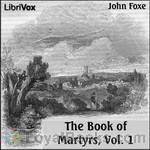 Foxe's Book of Martyrs, A History of the Lives
Foxe's Book of Martyrs, A History of the Lives
The Book of Martyrs, by John Foxe, is an English Protestant account of the persecutions of Protestants, many of whom had died for their beliefs within the decade immediately preceding its first publication. It was first published by John Day, in 1563. Lavishly illustrated with many woodcuts, it was the largest publishing project undertaken in Britain up to that time. Commonly known as, “Foxe’s Book of Martyrs”, the work’s full title begins with “Actes and Monuments of these Latter and Perillous Days, Touching Matters of the Church... | |
 Fox's Book of Martyrs Or A History of the Lives, Sufferings, and Triumphant Deaths of the Primitive Protestant Martyrs
Fox's Book of Martyrs Or A History of the Lives, Sufferings, and Triumphant Deaths of the Primitive Protestant Martyrs
| |
By: John Francis Davis (1859-1930) | |
|---|---|
 California Romantic and Resourceful A plea for the collection, preservation and diffusion of information relating to Pacific coast history
California Romantic and Resourceful A plea for the collection, preservation and diffusion of information relating to Pacific coast history
| |
By: John Frederick Bligh Livesay (1875-1944) | |
|---|---|
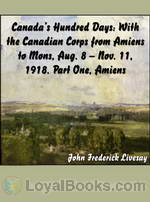 Canada's Hundred Days: With the Canadian Corps from Amiens to Mons 1918
Canada's Hundred Days: With the Canadian Corps from Amiens to Mons 1918
This is the incredible story of the actions of the men and women of the Canadian Expeditionary Force, Canada’s contribution to the Great War 1914-1919, during the last 100 days of the First World War. After nearly 4 years of stalemate (trench warfare) the Allied Forces planned to break through the German Hindenburg Line and then push the enemy from their defensive positions. You will follow the CEF as they take Amiens (Part One), Arras (Part Two), Cambrai (Part Three) and then the pursuit of the German Forces from Valenciennes to Mons (Part Four) in Belgium, the same place where the war began on August 4, 1914, on November 11, 1918. | |
By: John Fretwell | |
|---|---|
 Newfoundland and the Jingoes An Appeal to England's Honor
Newfoundland and the Jingoes An Appeal to England's Honor
| |
By: John Frost (1800-1859) | |
|---|---|
 Heroes and Hunters of the West Comprising Sketches and Adventures of Boone, Kenton, Brady, Logan, Whetzel, Fleehart, Hughes, Johnson, &c.
Heroes and Hunters of the West Comprising Sketches and Adventures of Boone, Kenton, Brady, Logan, Whetzel, Fleehart, Hughes, Johnson, &c.
| |
By: John G. (John George) Edgar (1834-1864) | |
|---|---|
 The Boy Crusaders A Story of the Days of Louis IX.
The Boy Crusaders A Story of the Days of Louis IX.
| |
By: John G. Lockhart (1794-1854) | |
|---|---|
 The History of Napoleon Buonaparte
The History of Napoleon Buonaparte
| |
By: John Galt (1779-1839) | |
|---|---|
 Ringan Gilhaize or The Covenanters
Ringan Gilhaize or The Covenanters
| |
By: John Geddie (1848-1937) | |
|---|---|
 The Balladists Famous Scots Series
The Balladists Famous Scots Series
| |
By: John George Bourinot (1837-1902) | |
|---|---|
 Canada
Canada
| |
By: John George Nicolay | |
|---|---|
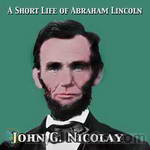 A Short Life of Abraham Lincoln
A Short Life of Abraham Lincoln
John G. Nicolay was Abraham Lincoln’s private White House secretary. With assistant secretary, John Hay, he wrote the two volume definitive biography of Lincoln, “Abraham Lincoln, a Biography.” Although this is a condensation by Nicolay of that biography, it is still a sizable work and a fairly thorough treatment of the life of the 16th president of the United States. | |
By: John Gilmary Shea (1824-1892) | |
|---|---|
 Discovery and Exploration of the Mississippi Valley
Discovery and Exploration of the Mississippi Valley
"It has long been a desideratum to have in English the early narratives, of the discovery and exploration of the Mississippi. Marquette's map and voyage have indeed appeared, but the narrative varies in no small degree from the authentic manuscript, and the map is not at all a copy of that still preserved, as it came from the hand of the great explorer. These published from original manuscripts, and accompanied by the narratives of the missionaries in La Salle's expedition, are now first presented in an accessible shape, and complete the annals of the exploration... | |
By: John Gneisenau Neihardt (1881-1973) | |
|---|---|
 The River and I
The River and I
| |
By: John Graham Gillam | |
|---|---|
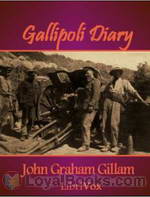 Gallipoli Diary
Gallipoli Diary
World War I was one of the most savage and brutal wars in human history. There were millions of deaths and the tragedy was compounded by the fact that these were all young men in the flower of youth. Both sides suffered heavy losses and this war is also notable for being one in which many new and terrible weapons were introduced by both to slaughter each other. Gallipoli Diary by John Graham Gillam is one of the many personal narratives written by survivors of this bloody conflict. Published in 1918, when memories of the war were still fresh in the minds of those who had experienced it, it is indeed a slice of history for modern-day readers who encounter it nearly a hundred years later. | |
By: John Greenleaf Whittier (1807-1892) | |
|---|---|
 Poems in Wartime From Volume III., the Works of Whittier: Anti-Slavery Poems and Songs of Labor and Reform
Poems in Wartime From Volume III., the Works of Whittier: Anti-Slavery Poems and Songs of Labor and Reform
| |
By: John Gregory Bourke (1846-1896) | |
|---|---|
 Apache Campaign In The Sierra Madre
Apache Campaign In The Sierra Madre
An account of the expedition [of the U.S. Army] in pursuit of the hostile Chiricahua Apaches in the spring of 1883. Bourke was a Medal of Honor awardee in the American Civil War whose subsequent Army career included several campaigns in the Indian wars of the mid to late 19th century in the American West. He wrote prolifically. He was mostly free of the unfortunate disdain for Native Americans common in 19th century America. He was quite admiring of many aspects of the Native American. “… Bourke had the opportunity to witness every facet of life in the Old West—the battles, wildlife, the internal squabbling among the military, the Indian Agency, settlers, and Native Americans... | |
By: John H. (John Harvey) Williams (1864-) | |
|---|---|
 The Mountain that was 'God' Being a Little Book About the Great Peak Which the Indians Named 'Tacoma' but Which is Officially Called 'Rainier'
The Mountain that was 'God' Being a Little Book About the Great Peak Which the Indians Named 'Tacoma' but Which is Officially Called 'Rainier'
| |
By: John H. (John Henry) Parker (1866-) | |
|---|---|
 History of the Gatling Gun Detachment, Fifth Army Corps, at Santiago With a Few Unvarnished Truths Concerning that Expedition
History of the Gatling Gun Detachment, Fifth Army Corps, at Santiago With a Few Unvarnished Truths Concerning that Expedition
| |
By: John H. Haaren (1855-1916) | |
|---|---|
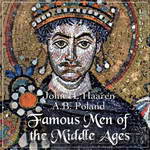 Famous Men of the Middle Ages
Famous Men of the Middle Ages
“THE study of history, like the study of a landscape, should begin with the most conspicuous features. Not until these have been fixed in memory will the lesser features fall into their appropriate places and assume their right proportions. The famous men of ancient and modern times are the mountain peaks of history. It is logical then that the study of history should begin with the biographies of these men. Not only is it logical; it is also pedagogical. Experience has proven that in order to attract and hold the child’s attention each conspicuous feature of history presented to him should have an individual for its center... | |
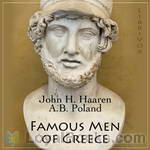 Famous Men of Greece
Famous Men of Greece
Famous Men of Greece is a series of biographical sketches written for the purpose of making the study of history lively and interesting by giving insight into the men who lived during this time. | |
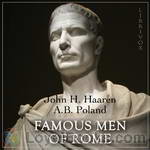 Famous Men of Rome
Famous Men of Rome
Famous Men of Rome is a series of biographical sketches written for the purpose of making the study of history lively and interesting by giving insight into the men who lived during this time. | |
By: John H. Haaren and A.B. Poland | |
|---|---|
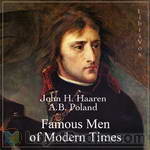 Famous Men of Modern Times
Famous Men of Modern Times
Famous Men of Modern Times is a series of biographical sketches written for the purpose of making the study of history lively and interesting by giving insight into the men who lived during this time. Summary by Laura Caldwell | |
By: John Hanning Speke (1827-1864) | |
|---|---|
 The Discovery of the Source of the Nile
The Discovery of the Source of the Nile
| |
By: John Hargrave (1894-1982) | |
|---|---|
 At Suvla Bay Being the notes and sketches of scenes, characters and adventures of the Dardanelles campaign
At Suvla Bay Being the notes and sketches of scenes, characters and adventures of the Dardanelles campaign
| |
By: John Hartman Morgan (1876-1955) | |
|---|---|
 Leaves from a Field Note-Book
Leaves from a Field Note-Book
| |
By: John Hasloch Potter (1847-1935) | |
|---|---|
 The Discipline of War Nine Addresses on the Lessons of the War in Connection with Lent
The Discipline of War Nine Addresses on the Lessons of the War in Connection with Lent
| |
By: John Hay (1835-1905) | |
|---|---|
 Castilian Days
Castilian Days
| |
By: John Henry Blunt (1823-1884) | |
|---|---|
 A Key to the Knowledge of Church History (Ancient)
A Key to the Knowledge of Church History (Ancient)
| |
By: John Henry Ingram (1842-1916) | |
|---|---|
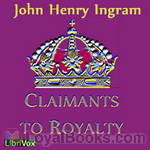 Claimants to Royalty
Claimants to Royalty
A compilation of chronicles of the numerous impostors and impostures of kings, queens, and rulers. | |